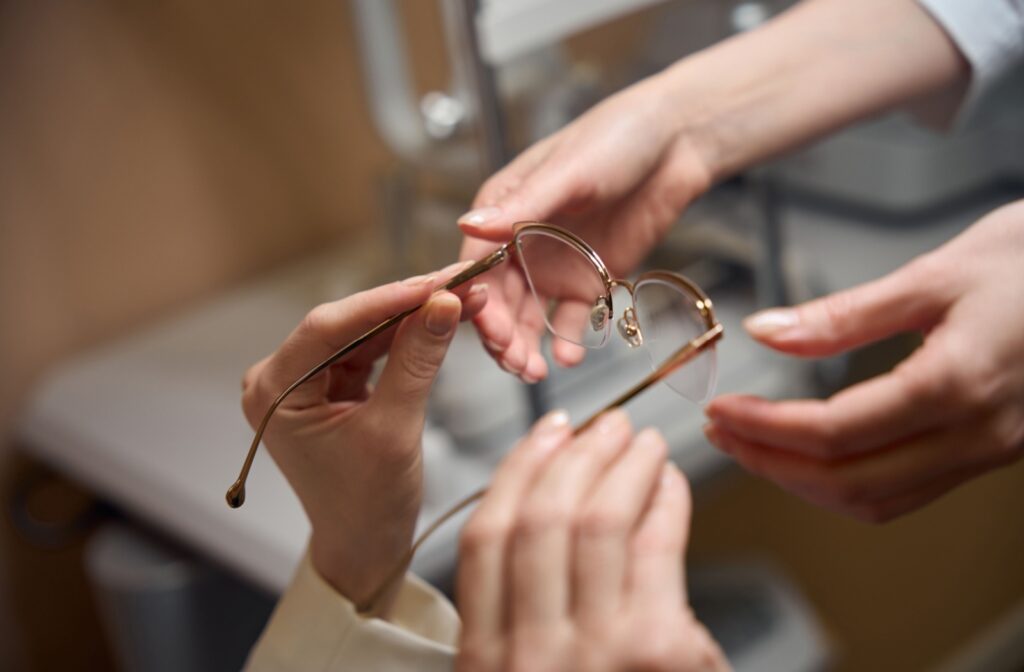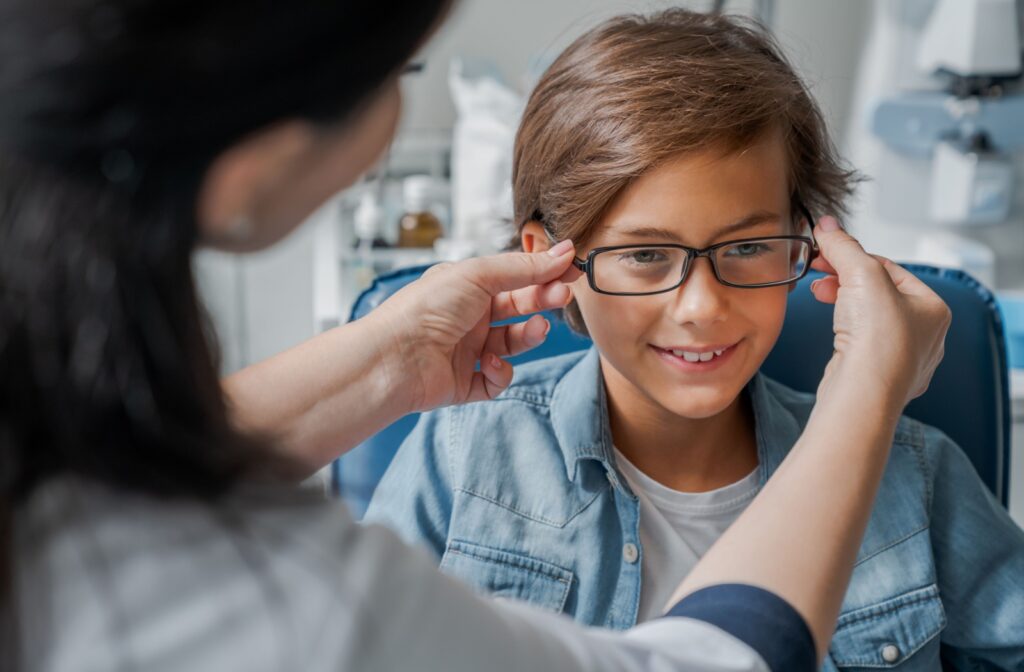The short answer? No, wearing your glasses too much will not harm your eyes. Glasses are intended to correct your vision and improve your quality of life, whether you wear them occasionally to read or if you wear them all day. Contrary to popular belief, wearing them regularly won’t make your eyes weaker or dependent on them. Instead, they can help you to see more clearly and reduce the strain caused by uncorrected vision.
The right glasses can improve your vision, allowing you to go about your day with clarity, whether you’re reading, driving, or simply enjoying the world around you!
Does Wearing Glasses Weaken Your Eyes?
A big misconception about glasses is that by wearing them all the time, your eyes will become weaker or dependent on them. However, this is untrue, as glasses do not change the eye’s biology. They help you see better by correcting refractive errors such as nearsightedness (myopia), farsightedness (hyperopia), and astigmatism.
According to the American Academy of Ophthalmology (AAO), glasses do not have any long-term effect on eye health. However, wearing an outdated prescription or the wrong type of glasses can cause eye strain, headaches, or discomfort as your eyes struggle to compensate for blurred vision.
Can Wearing Glasses Too Much Cause Eye Strain?
Although wearing glasses won’t cause eye strain directly, poor habits associated with prolonged visual focus might. For example:
- Staring at screens for prolonged periods of time without breaks can lead to digital eye strain.
- Wearing glasses with an outdated prescription can cause you to squint or struggle to see clearly, increasing the risk of discomfort.
Tips to Prevent Eye Strain
- Follow the 20-20-20 Rule. Every 20 minutes, look at something 20 feet away for at least 20 seconds.
- Book regular checkups with your eye doctor to verify that your glasses prescription is current.
The Importance of Wearing Glasses Correctly
Wearing a proper prescription for your glasses can help you to not only see more clearly but also improve your eye health. For individuals with refractive errors, not using corrective lenses can lead to unnecessary strain on other parts of the visual system.
Additionally, specialized glasses, such as UV protection lenses, can be worn to shield your eyes from potentially harmful ultraviolet light, which has been linked to cataracts and other eye diseases.
Get The Most Out Of Your Glasses
- Keep the lenses clean and free of scratches
- Adjust the fit to they can rest properly on your face
- Replace them if you notice any changes in your vision
- Use blue-light filtering lenses if you’re often looking at a screen

Are There Situations Where Glasses Might Be a Problem?
While wearing glasses is often beneficial, there may be a few exceptions to keep in mind:
- Sports & activities: Glasses might not be the ideal tool for physical activities. Consider prescription sports goggles for contact lenses if you’re often involved in contact sports.
- Ill-fitting frames: Glasses that don’t fit well can press against the bridge of your nose, temples, or ears– causing discomfort or even mild headaches.
- Glare sensitivity: Bright light reflecting off glasses can be a nuisance. You might consider opting for anti-reflecting coatings to improve clarity and reduce glare.
Tips to Protect Your Eye Health While Wearing Glasses
While wearing glasses might not harm your eyes, it should be a priority to take good care of your eye health. Here are some tips to keep in mind:
Schedule Regular Eye Exams
A comprehensive eye exam can help to identify any hidden symptoms or underlying eye conditions you might have missed. Booking regular checkups with your eye doctor is a good way to stay proactive.
Practice Good Screen Hygiene
With many activities such as work and school often involving the use of screens, it’s important to take steps to reduce digital eye strain.
- Maintain proper distance between your eyes and the screen
- Use blue-light glasses or adjust your device setting for night mode
- Ensure your workspace has sufficient lighting to reduce glare
Eat for Your Eyes
A balanced diet rich in omega-3 fatty acids, zine, and vitamins C and E can help to keep your eyes healthy. Leafy greens, fish, and carrots are all great choices full of healthy nutrients.
Wear Sunglasses Outdoors
The sun can cause some issues with your eye health, so it’s a good idea to protect your eye from UV damage by wearing sunglasses that block UVA and UVB rays outdoors.
Stay Hydrated
Dry eyes are a common issue that affect many people in the United States, especially contact wearers. Drink plenty of water and consider using artificial tears to keep your eyes comfortable.
Take Your Glasses Off to Sleep
Wearing your glasses to bed can put extra strain on the frames or lenses, leading to damage or discomfort. It’s recommended to remove your glasses and contact lenses before going to be unless instructed otherwise.
Get Your Glasses Today
By keeping up with regular eye exams, updating your prescriptions, and practicing good eye hygiene, you can confidently wear your glasses as much as you need.
Still unsure about your vision needs or feeling like your prescription isn’t quite right? Schedule an appointment with Pack & Bianes Optometry today, and speak with one of our experienced eye doctors.



